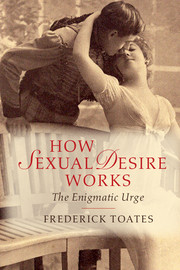Book contents
- Frontmatter
- Dedication
- Contents
- List of figures
- Preface
- One What is enigmatic about sexual desire?
- Two Explaining desire: multiple perspectives
- Three Sexual desire in a broad context
- Four An incentive-based model
- Five Sex and levels of organization
- Six Sexual attraction
- Seven Shades of desire from simple to complex
- Eight Details of the brain and desire
- Nine Arousal
- Ten The consequences of sexual behaviour and associated expectations
- Eleven Sexual familiarity and novelty
- Twelve Inhibition, conflict and temptation
- Thirteen How did sexual desire get here?
- Fourteen Setting the trajectory: link to adult sexuality
- Fifteen Sexual desire in interaction
- Sixteen Representations of sex
- Seventeen Sexual addiction
- Eighteen Variations in desire: general principles
- Nineteen Some forms of desire at the fringes
- Twenty The toxic fusion: violence and sexual desire
- Twenty one Sexually associated (serial) murder
- Twenty two Concluding remarks
- Notes
- References
- Index
Ten - The consequences of sexual behaviour and associated expectations
Published online by Cambridge University Press: 05 October 2014
- Frontmatter
- Dedication
- Contents
- List of figures
- Preface
- One What is enigmatic about sexual desire?
- Two Explaining desire: multiple perspectives
- Three Sexual desire in a broad context
- Four An incentive-based model
- Five Sex and levels of organization
- Six Sexual attraction
- Seven Shades of desire from simple to complex
- Eight Details of the brain and desire
- Nine Arousal
- Ten The consequences of sexual behaviour and associated expectations
- Eleven Sexual familiarity and novelty
- Twelve Inhibition, conflict and temptation
- Thirteen How did sexual desire get here?
- Fourteen Setting the trajectory: link to adult sexuality
- Fifteen Sexual desire in interaction
- Sixteen Representations of sex
- Seventeen Sexual addiction
- Eighteen Variations in desire: general principles
- Nineteen Some forms of desire at the fringes
- Twenty The toxic fusion: violence and sexual desire
- Twenty one Sexually associated (serial) murder
- Twenty two Concluding remarks
- Notes
- References
- Index
Summary
Nature has placed mankind under the governance of two sovereign masters, pain and pleasure. It is for them alone to point out what we ought to do, as well as to determine what we shall do.
(Jeremy Bentham, 1781/1988, p. 1)Evidence suggests that they might not be quite the sovereign masters that Bentham supposed, though pleasure and pain feature large in any explanation of human sexuality.
Basics
Engaging in sexual behaviour has immediate consequences and these are generally assumed to influence future sexuality in terms of desire and the chances of sexual behaviour being repeated (Bancroft, 2009). Consequences of behaviour that encourage us to repeat the behaviour are known as ‘reinforcers’ (Chapter 2). Conversely, the consequences can be such as to reduce the future tendency to repeat the behaviour, in which case they would be described as ‘punishing’. Viewed in evolutionary terms, reinforcement encourages people to repeat behaviour that has served reproduction, whereas punishment persuades them to resist, stop, take stock of the situation and change behaviour. This chapter looks into the details of these immediate consequences of sexual behaviour and their link to desire.
- Type
- Chapter
- Information
- How Sexual Desire WorksThe Enigmatic Urge, pp. 178 - 187Publisher: Cambridge University PressPrint publication year: 2014



